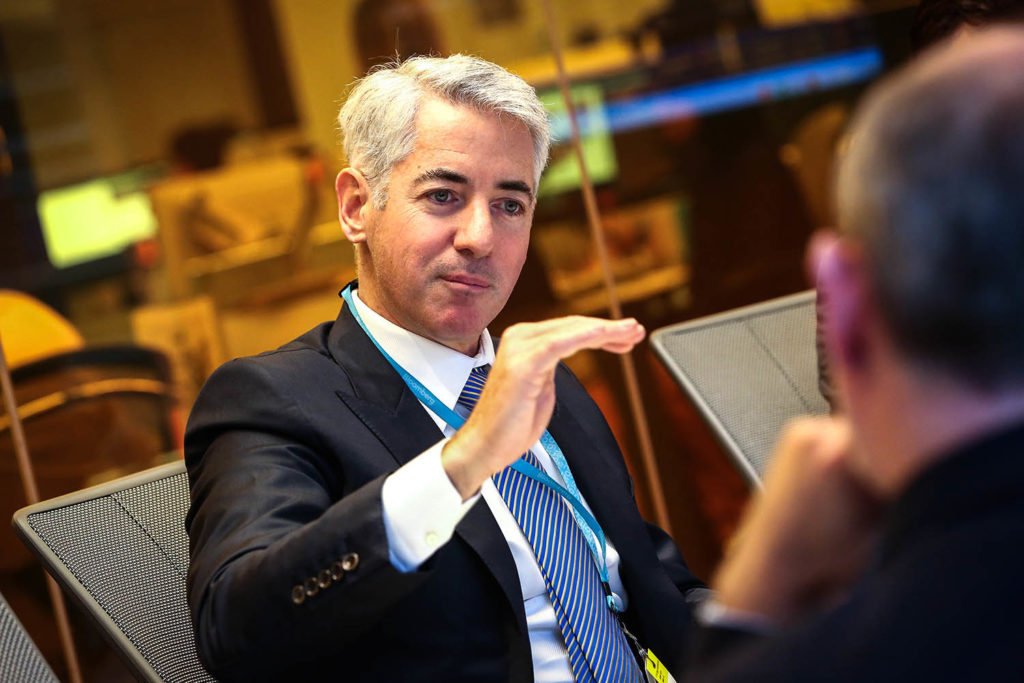What just happened

- French diplomats raised hopes of de-escalating the Russia-Ukraine crisis after five hours of talks between Emmanuel Macron and Vladimir Putin in Moscow.
- Sir Keir Starmer, the Labour leader, had to be bundled into a police car for his protection after conspiracy theorists mobbed him outside parliament.
- Kamila Valieva, 15, became the first female skater to land a quadruple jump in Olympic competition.
After a decade of historic lows, interest rates are rising. This is a problem for most borrowers, but not for Bill Ackman.
Higher rates will mean higher bills for homeowners, but for Ackman the prospect of rate rises has already meant a gain of about $1.25 billion.
He is founder of Pershing Capital, a New York-based hedge fund that has performed prodigiously throughout the pandemic. That is not unusual for a hedge fund. What is unusual about Ackman’s position is that he has been able to argue privately as well as publicly for higher rates, and to profit from speculation that they will rise.
Ackman sits on the New York Fed’s Investor Advisory Committee on Financial Markets (IACFM), which the bank says serves as a “forum for informal discussions on financial, economic and public policy issues” and helps inform the Fed’s senior management.
Last October he gave a presentation as a member of the committee, arguing that the Fed should start raising rates as soon as possible. In January, the bank confirmed speculation that rates would likely soon rise, driving up values of “swaptions” – bets on rising interest rates – that Pershing held in spades. Later that day the fund said it had sold most of its swaptions “generating proceeds of $1.25 billion”.
There is nothing secret or illegal about these trades or others like them by rival funds. Pershing first disclosed its hedge last March, and it did so again in August as the swaptions gained in value. These transactions have been happening in plain sight. As such they shed new light on a relationship between big investors and the Fed that is already under scrutiny because of transactions by the bank’s own officials.
A timeline:
- December 2020: Pershing Capital invests $177 million in swaption hedges. Swaption values start rising.
- March 2021: Pershing discloses its swaptions position.
- August 2021: Pershing discloses appreciation in it’s swaptions position.
- 20 October 2021: Ackman urges the Fed at an IACFM meeting to raise rates to avoid reputational risk and hurting “the most vulnerable”.
- 15 January 2022: Ackman tweets: “The @federalreserve could work to restore its credibility with an initial 50 bps [basis points, equivalent to 0.5 per cent] surprise move to shock and awe the market, which would demonstrate its resolve on inflation.”
- 26 January 2022: in the FOMC meeting Jay Powell, the Fed Chair, indicates that rate rise will soon be appropriate, leading to a further rise in the value of swaptions.
- 26 January 2022: hours after the FOMC meeting Ackman announces on Twitter that he has sold 80 percent of his swaptions for $1.25 billion.
Ackman declared his stake in interest rate swaptions before the 20 October meeting, but not at it. Sources say committee members aren’t required to declare their positions. Rather, it’s assumed that those present “talk their books” – offering comments based on their own experience and exposure. The Fed, meanwhile, claims to be in listening mode.
A spokesperson for the New York Fed said: “We’re not executing on the advice of the advisory groups. These meetings exist in the interest of collecting market intelligence. And so we meet with the investor advisory committee to collect data.”
Questions remain:
- Why are investors with stakes in the decisions made by branches of the Federal Reserve invited to advise them?
- Why are these investors not required to declare in meetings any commercial interest in decisions the Fed takes?
To note:
- In March 2020, Ackman claimed his firm made $2.6 billion betting that the coronavirus outbreak would cause a market crash, barely a week after warning that “hell is coming” for US companies unless the government acted quickly.
- In October 2021, two Fed presidents resigned after criticism of their investment activities. Last month the Fed’s Vice Chair, Richard Clarida, also resigned following amended disclosures about transactions at the start of the pandemic – disclosures described by Senator Elizabeth Warren as “just the latest evidence of a deep-rooted ethics failure at the Fed”.
Mr Ackman was invited to comment for this article but declined.
This article has been edited since publication.

Indian incentives
Maharashtra’s state government plans to boost incentives for Amazon, Uber and other big fleet managers to go electric. The state is India’s second-most populous and the single largest contributor to national GDP thanks largely to Mumbai. It also hosts a rapidly growing electric vehicle industry and its urban areas suffer from dismal air quality for much of the year. The combination of economic opportunity and public health emergency has already led to ambitious transport electrification targets with a 2025 deadline, but the state’s environment minister, Aaditya Thackeray, now tells Reuters he wants to bring that forward. Incentives could include discounts for bulk purchases of locally manufactured vehicles, and lower import taxes for Teslas.
Beijing for Las Malvinas
China has made a firm friend in Argentina and infuriated the UK by endorsing the idea of Argentinian sovereignty over the Falklands. It’s not hard to see why. If geographical proximity is a factor in determining sovereignty then Taiwan is half-way to being part of mainland China. The UK of course rejects this and Liz Truss, the foreign secretary, has seized the opportunity to sound like Margaret Thatcher c. 1982 by telling Beijing to back off. “We completely reject any question of sovereignty over the Falklands,” she tweeted on Sunday night. To note: whatever you make of Britain’s claim on the Falklands, it goes back more than a century and the islanders voted overwhelmingly to stay British in a 2018 referendum. There has never been an equivalent show of hands for Beijing in Taiwan, which the Chinese Communist Party has never, in its 73 years in power, controlled.

UK OKs HPR1000
The UK’s Office for Nuclear Regulation has approved a Chinese nuclear reactor design that may or may not lead to a new Chinese nuclear power station being built in Britain but will almost certainly boost China’s chances of selling nuclear tech abroad. The design is for a pressurised water reactor known as the HPR1000, which the UK regulator says it has been scrutinising for five years. The politics of Anglo-Chinese nuclear cooperation are fraught: the Shanghai-based China General Nuclear company (CGN) retains a 33 per cent stake in the Hinkley Point station under construction in Somerset, but Sinophobe Tory MPs have been trying to squeeze CGN out of it for years. Not only have they failed so far – there is now no regulatory barrier to the construction of an HPR1000 at Bradwell in Essex. Oh, and the prime minister’s new comms chief, Guto Harri, is an ex-lobbyist for Huawei.
HIV infections
There are more new HIV diagnoses in England among heterosexuals than among gay and bisexual men for the first time in a decade, according to the UK Health Security Agency. The statistic is all the more significant given a significant (33 per cent) drop in the number of heterosexuals getting tested for HIV during 2020 compared with gay men (a 7 per cent drop). The steady fall in HIV diagnosis for gay men – 70 per cent since 2014 – is a sign targeted testing, as well as the availability of the HIV prevention pill PrEP, has been successful. It’s also a sign that the government’s goal of zero HIV by 2030 could be achievable. But, like Covid, the global picture is far from equal. Although overall mortality has improved since 2010, according to UNAIDS sub-Saharan Africa maintains the brunt of HIV infections – and deaths. The infection rate among gay men is increasing, and so is the risk of death from Covid if you are HIV positive too. We repeat: no one is safe until everyone is safe.











